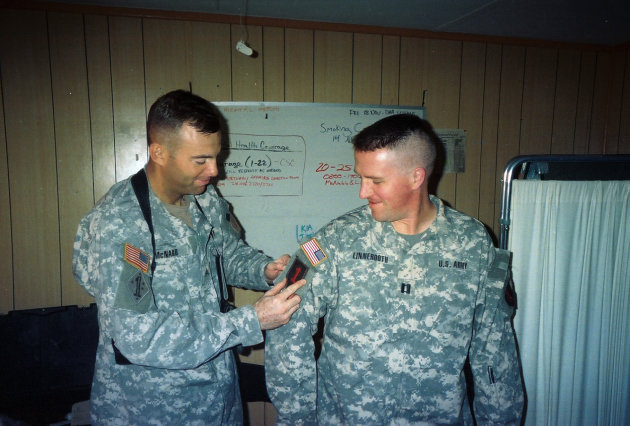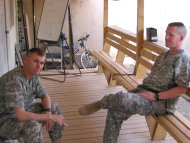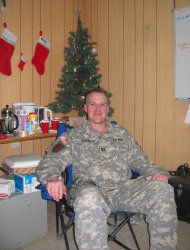He had a knack for soothing soldiers who'd just seen their buddies killed by bombs. He knew how to comfort medics sickened by the smell of blood and troops haunted by the screams of horribly burned Iraqi children.
Capt. Peter Linnerooth was an Army psychologist. He counseled soldiers during some of the fiercest fighting in Iraq. Hundreds upon hundreds sought his help. For nightmares and insomnia. For shock and grief. And for reaching that point where they just wanted to end it all.
Linnerooth did such a good job his Army comrades dubbed him The Wizard. His "magic" was deceptively simple: an instant rapport with soldiers, an empathetic manner, a big heart.
For a year during one of the bloodiest stretches of the Iraq war, Linnerooth met with soldiers 60 to 70 hours a week. Sometimes he'd hop on helicopters or join convoys, risking mortars and roadside bombs. Often, though, the soldiers came to his shoebox-sized "office" at Camp Liberty in Baghdad.
There they'd encounter a raspy-voiced, broad-shouldered guy who blasted Motorhead, Iron Maiden and other ear-shattering heavy metal, favored four-letter words and inhaled Marlboro Reds — once even while conducting a "stop smoking" class. He was THAT persuasive.
Linnerooth knew when to be a friend and when to be a professional Army officer. He could be tough, even gruff at times, but he also was a gentle soul, a born storyteller, a proud dad who decorated his quarters with his kids' drawings and photos. He carried his newborn daughter's shoes on his ruck sack for good luck.
Linnerooth left Iraq in 2007, a few months short of the end of his 15-month tour. He couldn't take it anymore. He'd heard enough terrible stories. He'd seen enough dead and dying.
He became a college professor in Minnesota, then counseled vets in California and Nevada. He'd done much to help the troops, but in his mind, it wasn't enough. He worried about veteran suicides. He wrote about professional burnout. He grappled with PTSD, depression and anger, his despair spiraling into an overdose. He divorced and married again. He fought valiantly to get his life in order.
But he couldn't make it happen.
As the new year dawned, Pete Linnerooth, Bronze Star recipient, admired Army captain, devoted father, turned his gun on himself. He was 42.
He was, as one buddy says, the guy who could help everybody — everybody but himself.
___
He liked to jokingly compare himself to an intrepid explorer stranded in one of the most remote corners of the earth.
Linnerooth's best buddy, Brock McNabb, recalls how they'd laugh and find parallels to the plight of Ernest Shackleton, whose ship, Endurance, became trapped in the Antarctic during an early 20th-century expedition. The crew ended up on an ice floe, scrambling to survive.
This was the 100-degree desert, of course, but for them, the analogy was apt: Both were impossible missions — Linnerooth and two teammates were responsible for the mental stability and psychological care of thousands — and both groups leaned on one another for emotional sustenance.
"There's no cavalry to save the day," McNabb explains. "You ARE the cavalry. There was no relief."
McNabb and a third soldier, Travis Landchild, were the tight-knit mental health crew in charge of the 2nd Brigade Combat Team, 1st Infantry Division in the Baghdad area. They were there when the surge began, rocket attacks increased and the death toll mounted.
Landchild says the three dubbed themselves "a dysfunctional tripod." Translation: One of the three "legs" was always broken, or stressed out, and without fail, "the other two would step up and support that person."
A few months into their tour, McNabb says, both he and Linnerooth — with the approval of on-site doctors — began taking antidepressants. "He had to have training wheels," McNabb says. "We all did."
They worked non-stop, even overnight sometimes. They listened so intently, their nightmares were not their own.
They saw guys who'd witnessed Humvees vaporize before them, medics barely out of high school dealing with double amputations, women sexually assaulted in combat zones. There were soldiers suffering from paranoia, bipolar disorder, anxiety — one was wetting his bed. And then there were those escorted under guard after threatening suicide.
"People are in rough, rough shape ... it's misery all the time, and it does affect you," McNabb says.
Linnerooth — the only trained psychologist of the three — was frustrated by what he regarded as the Army's view of mental health as a second-class problem that can be minimized or overlooked during deployment, McNabb says. At times, he also felt powerless — stabilizing soldiers, then having to return them to missions, knowing they'd be traumatized again.
"Sometimes he felt he was putting a Band-Aid over a bullet hole," McNabb says. "It would be, 'I got you to where you can sleep through the night ... but guess what? You have seven months left in your deployment.'"
For about half his tour, Linnerooth's office was a 12-by-12 trailer. His heavy-metal soundtrack — he banned the Beatles and Pink Floyd, deeming them too sad — provided a sound buffer. A thermal blanket serving as a makeshift room divider also provided a modicum of privacy.
Linnerooth brought hope to those gripped by hopelessness. In a desert, he could always find the glass half full.
He turned tragedies into cathartic moments: When a platoon lost a member, he'd encourage the survivors to deal with their grief by writing letters to the children of the fallen soldier, recounting the great things about their father.
He used irreverence as a balm: When he met with troops in a chapel after a suicide bomb intended for them instead struck a group of Iraqi schoolgirls, he punctuated his remarks with a four-letter word. God, he insisted, surely wouldn't mind him cussing in a religious sanctuary, all things considered. Then he offered comfort.
"It IS horrible," McNabb quotes him as saying. "'There are bad guys out there ... 'You're brave soldiers. You're being asked to do a job no one could do.'"
But Linnerooth wasn't just dealing with emotional trauma. He was in the same complex as the busy Riva Ridge Troop Medical Clinic. When mass casualties arrived, he was there squeezing IV bags, handling bandages.
Later on, talking with family, he'd hint of the horror in sketchy details, describing how a blocked drain once left the soldiers ankle-deep in blood, or the agony of Iraqi kids dying slowly.
Linnerooth did elaborate in one essay. In words both graphic and incredibly tender, he described a female soldier brought in with mortal wounds. Her Humvee, while on a rescue mission, had been struck by an armor-penetrating explosive.
"I stood at her head and considered her hair, for Christsakes!" he wrote. "The blast had mussed her hair. Removed her foot, cleaved her abdomen, but mussed her hair. For whatever reason I looked at it and longed to smooth it back from her forehead. Like I do for my children. It was reddish-blond, curly, almost kinky, and in disarray. I looked around me to see if anyone would notice this gesture, if anyone would mind. Hell, I don't know what to do in an abattoir of human suffering, it's not my job. I deal with easy things, like the paranoid, the personality disordered, and those without hope. All I wanted to do was smooth her hair, perhaps compose her for the next stage of her journey. But I never did it, and regret it to this day."
___
Even as he continued to comfort others, Linnerooth was showing signs of strain.
Ray Nixon, then a medic at Riva Ridge, remembers anguishing over critical decisions — assigning soldiers to what could be life-and-death missions — and talking with Linnerooth.
"Pete would always tell me, 'You're doing the best job you can. You're well trained,'" Nixon says. "He always made me feel better. He knew exactly what to say, exactly what direction to guide you in — but Pete was very bad at taking care of himself. Any time he was having problems or getting overwhelmed, instead of asking for help, he'd lock himself in his room and try to deal with it alone."
He had always been this way. His mother, Gayle McMullen, who adopted Pete when he was 9½ weeks old, recalls a loving little boy who adored animals, talked up a storm at 18 months old and was very sensitive. He clammed up when upset. "You could see something was bothering him, but he kept a lot inside," she says.
In Iraq, Linnerooth avoided socializing. Friends, he'd say, were potential patients.
His buddies gave him space, but they noticed he wasn't bouncing back as he had before.
A year into the tour, McNabb says, Linnerooth walked in a doctor's office and said: "'I can't stand it. This is too much. How much more misery and torture are these kids going to go through?'"
The doctor, McNabb says, asked if he might hurt himself. Linnerooth replied he wasn't sure.
As he was evacuated, he told McNabb he was crushed having to abandon his teammates. They saw it otherwise.
"We didn't know if any of us were going to get out alive. You never do in war," Landchild says. "We kind of had this hope that one of us made it. Yeah, he's broken as heck and he has a lot of healing to do but he got OUT."
___
He wasn't the same. His family noticed it when they met him in Schweinfurt, Germany.
"He came home burdened," says his younger sister, Mary Linnerooth Gonzalez. "He was disappointed that he couldn't affect the wheels of change. ... I think he was defeated."
Amy, Linnerooth's wife at the time — they'd met as teens in Rochester, Minn. — says they had trouble resuming their lives. He didn't discuss what he'd seen while in Iraq, and didn't open up at home.
"I think it was just kind of like a wall that he put up," she says. "I asked him about that later and he said if he let that guard down, then it would be like a dam flooding and it would just all come out and he couldn't be that way."
There were some early warning signs, she says, including jokes about suicide. She dismissed it as gallows humor.
In 2008, after nearly six years in the Army, Linnerooth was a civilian again, returning to an academic world where he'd thrived.
He was the kind of student professors rave about for years, describing him as "brilliant" and "amazing."
Patrick Friman, who was in charge of Linnerooth's doctoral dissertation at the University of Nevada-Reno, remembers a day when his then-student joined him for training at an out-patient psychological clinic. A mother was struggling with her 3-year-old: The girl wouldn't sleep in her own bed, wasn't toilet trained and refused to do what her mother asked.
It soon became clear that Linnerooth, the novice, was much better at relating to the mother than the trained professor. "I marveled at how well he described the problem, the solution and the steps that need to be taken to achieve it," Friman says. "She was hanging on his every word. She couldn't wait to go home to try it."
Linnerooth recommended the mother set reasonable bed times, be affectionate when her child was behaving and make other adjustments. The plan succeeded. "He wanted to learn how to work with kids and he was just a natural at it," Friman says.
Linnerooth also had made an impression at Minnesota State University-Mankato, where he earned his master's degree. Professor Daniel Houlihan, who was his adviser, remembers an enormously gifted writer who was prescient about the war — years before, he had warned of a high military suicide rate.
He was hired to teach psychology at the school in 2008. Still raw from Iraq, he quickly became annoyed with 19 year olds griping about tough grading standards. He'd just come from a place where 19 year olds worried about their very survival.
Linnerooth began missing meetings. He seemed paranoid, spending a lot of time in his office shredding papers, Houlihan recalls.
Jeffrey Buchanan, another professor in Mankato who'd been friends with Linnerooth and his wife since grad school, says the confident, self-assured Pete was gone. "It seemed like he was questioning every decision he was making," he says.
Things were also bad at home. Amy Linnerooth says they tried marital counseling.
Her husband seemed two people, she says. "It would be like the guy you knew ... then a little thing would set him off," she recalls. "I remember telling him 'I just want to blend in with the wallpaper. I don't want to be in your way.' It was like walking on eggshells."
In early 2009, Linnerooth's depression took a disastrous turn. He nearly died from an overdose of pills.
His buddy, McNabb, phoned.
"Jesus, man you can't even kill yourself right," he teased. Linnerooth laughed.
But he also confided: "I just hated where my life was going. Here, I'm arguing with my wife. ... I want to be normal for my kids. ... I was tired of being here.'"
Amy Linnerooth says her husband was very remorseful. "He thought that was a really stupid thing to do to the kids and us," she says. She was convinced he'd never try to harm himself again.
By late 2009, though, his marriage was failing and his job was in jeopardy.
Houlihan, his colleague, approached him. "This just isn't working well," he said. "We've got to figure out how we can salvage your career."
The professor expected Linnerooth to be defensive. Instead, he was relieved to confront the problems.
He was given an extended leave and headed west to start a new life.
____
McNabb had invited his pal to him join him at the Santa Cruz County Vet Center in California.
He arrived looking terrible, but soon shed 50 pounds and shaved his long beard. He moved in across the street from McNabb. They spent nights chatting over beers.
Linnerooth liked his new surroundings but his ongoing divorce and separation from his kids weighed on him. Still, he remained an attentive, loving father. He'd fly to Minnesota often and while in California, he'd call his children, Jack, 9, and Whitney, 6, every night. He'd read to his son; he created a cartoon series for his daughter featuring a spider they called Gigerenzer. He'd Skype with his kids, too, content just to watch them watch TV.
Linnerooth also felt his work as a veterans' readjustment counselor was helping people. He spoke at symposiums about the emotional trauma of war. With McNabb, he conducted a suicide prevention class for an Army Reserve unit, even as he himself was being treated for his own PTSD.
He became more vocal about the strains on military psychologists. Linnerooth talked about the pressures to The New York Times and Time. He told the magazine in 2010 "the Army has been criminally negligent," in not having enough mental health experts to serve combat vets, putting a bigger burden on those trying to do the job.
He joined Bret Moore, another former Army psychologist he befriended before Iraq, to produce an academic paper about professional burnout. "He wanted to write and get the word out," Moore says. "It was therapeutic for him. ... He really was putting his heart and soul into it."
For a time, Linnerooth seemed happy, telling Moore about his budding relationship with Melanie Walsh, a social worker. They'd met a decade earlier when she was an undergraduate assistant at Reno. Moore was invited to their July 2011 wedding in Lake Tahoe.
As the months wore on, though, he reported marital strains. He also was missing deadlines for their paper.
Moore says he eventually toned down Linnerooth's work to make it more academic and less emotional. "You could really see the anger," he says, noting it reflected both his attitude toward the military and his disintegrating personal life. The paper was published in 2011 in an American Psychological Association journal.
Linnerooth moved to Reno to be with his new wife. He was hired by the Department of Veterans Affairs to work with vets struggling with PTSD and substance abuse.
There was a hitch, though. He was approaching a two-year deadline to get a state license required by the VA.
McNabb urged him to take the test. Whether it was depression or another reason, he didn't. The VA let him go. (The agency said in a January statement that it was forced to terminate Linnerooth because of the lack of licensing but offered to take him back once he finished the requirements.)
"He felt betrayed," his widow says. "He deteriorated after that and he deteriorated quickly."
"It broke him yet again," his sister says. "He felt let down by the system."
Even for "a fairly resilient guy," Moore says, "there was just one letdown right after the other. He never got any breathing room."
___
At the end of last summer, Linnerooth returned home to Minnesota so he could see his children daily. He did travel back to California, though, for a joyous occasion — the birth of his son, David.
He spoke often with his buddy, McNabb, and seemed optimistic, considering new careers outside psychology But he kept his distance, too, not telling former university colleagues he was back.
Linnerooth was busy with family during the holidays: He sent his mother a text thanking her for the kids' Christmas gifts, traveled west to see his baby and sent photos of the infant in a green monster outfit to his sister, Mary. On Jan. 1, he spent a happy day with his son, Jack, and was planning another visit with David.
The next day, though, McNabb says, a fight with his wife, alcohol and a loaded gun proved a tragic combination.
He left a note with instructions, but no explanation of why he'd taken his life.
"For the record, Pete Linnerooth did not want to die," McNabb says. "He just wanted the pain to end. Big difference."
For all those who loved and admired him, for all those who saw him at his best and worst, these past weeks have been filled with sorrow, regret and inescapable irony.
"He didn't like to burden other people," his widow says. "He liked to take care of other people. I don't know anyone who knew how to comfort people like he did. ... He was very kind. He was sincere. He was generous. He was patient. He was forgiving. It's such a tragedy. He had the skill, he genuinely cared and he could have helped so many people. And now he's gone."
___
His family and friends gathered on a bitter cold January day in Minnesota to bid farewell.
The night before, his Army pals flew in from around the country and toasted their buddy with prodigious amounts of scotch and rum. They shared favorite Pete stories and placed his urn on the table, covering it with a Motorhead T-shirt.
Later in the hotel room near Fort Snelling National Cemetery, McNabb mulled over how to leave a legacy for his friend's kids — a memorial that would give them peace and make them proud. But he was limited to 30 characters for the message on Pete's headstone. How do you honor a life in a handful of words?
McNabb then remembered something Linnerooth had once told him: "Maybe we're all meant for just one great deed and we're done."
That gave him an idea.
The next day, on a 4-degree, cloudless morning, Capt. Peter J.N. Linnerooth was laid to rest with taps and a 21-gun salute.
McNabb presented Linnerooth's son, Jack, with his father's Bronze Star, telling him: "Don't forget your dad was so very proud of you."
After the mourners met for lunch and more reminiscences, a small group of Army friends who'd served with him in Iraq returned to the unmarked stone as the sun lowered in the winter sky.
McNabb leaned over a long arm, tapped the marble and addressed Pete:
"You owe me a ---- ton of beers when I see you next," he said with a smile.
Then he surveyed the surrounding graves, calling out to Pete those buried nearby, when they served and in what branch of military. These were now his neighbors.
"You're with all these people who'll love you for all time," he said.
It was finally time to go.
On a February day, the engraved headstone arrived. It's etched with Peter Linnerooth's name, his military service and a tribute to his great deed, summed up in this spare epitaph:
HE SAVED MANY
NOW HE'S HOME.
___
Sharon Cohen is a Chicago-based national writer. She can be reached at scohen(at)ap.org.
 Patricia EvangelistaThe
camera began rolling when she was seven years old. They called her
Kris, the small girl with flyaway bangs and missing teeth who stood on
her tiptoes to speak into double microphones.
Patricia EvangelistaThe
camera began rolling when she was seven years old. They called her
Kris, the small girl with flyaway bangs and missing teeth who stood on
her tiptoes to speak into double microphones.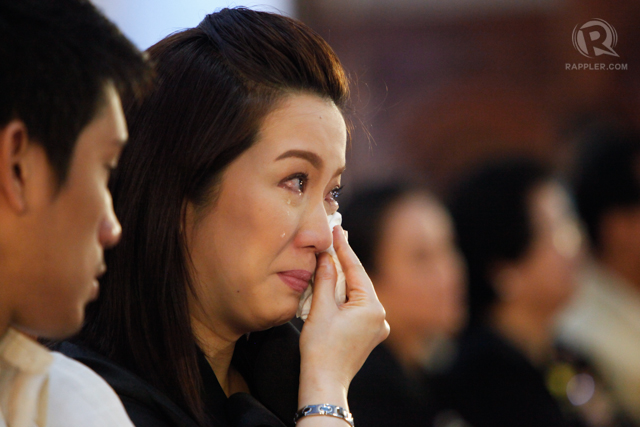 IN BETTER TIMES. Kris Aquino and James Yap in 2009. File photo Rappler/John Javellana
IN BETTER TIMES. Kris Aquino and James Yap in 2009. File photo Rappler/John Javellana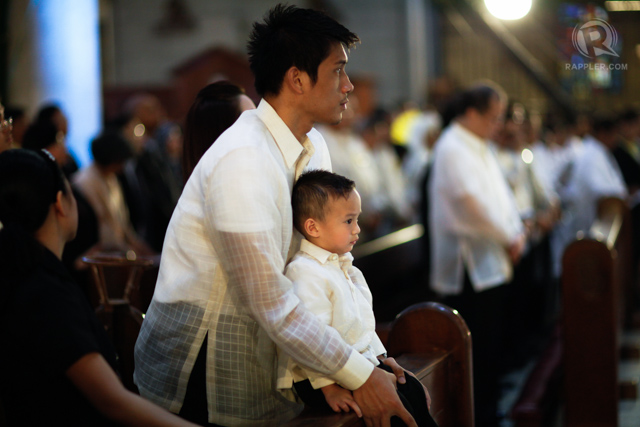 FATHER AND SON. James and Bimby Yap. File photo Rappler/John Javellana
FATHER AND SON. James and Bimby Yap. File photo Rappler/John Javellana 


 By
By 





